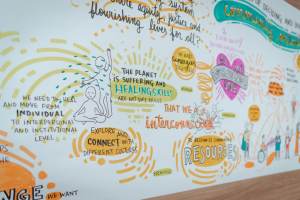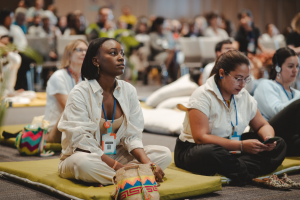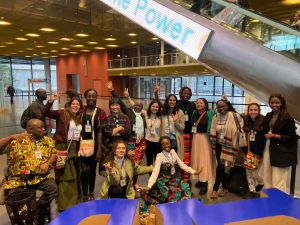What I learned from the #ShiftThePower Fellowship
24 Sep 2024

Yande Kalengo, Power Shifting Director at Restless Development & a 2023 / 2024 #ShiftThePower Fellow
When I received the confirmation email about being selected for this Fellowship with the GFCF I was both excited and nervous. The concept of shifting power remains a topic of debate and sometimes harsh criticism within the development sector. The idea of being part of a movement that actively challenges the status quo intrigued me. It felt like an incredible opportunity to not only learn but also to connect with like-minded individuals equally passionate about redefining the sector’s power dynamics.
Key learnings from the Fellowship
Power in community
Shifting power isn’t something we can achieve individually — it requires a collective effort. A thriving community, with diverse actors working on different aspects of the #ShiftThePower movement, is essential. In my role as Power Shifting Director at Restless Development, I focus on addressing the internal systems and structures that perpetuate inequality. However, this work often leaves you feeling isolated, like you’re working in a silo. The fellowship taught me that true change requires more than one person or organization — it’s about building networks, leveraging diverse expertise, and fostering resilience on a global scale.
I reflected on this after the #ShiftThePower Global Summit, where I wrote a blog emphasizing that egos and silos won’t drive impactful change. To power this movement, we need a collective mind-set and collaboration across sectors and borders.
Measurement matters
Who defines success, and who holds the power to set these parameters? One of the key conversations during the Fellowship weaving conversations was around revolutionizing the way we measure success in development. The power to define “success” often lies in the hands of those who already hold power. If we’re serious about shifting power, we need to rethink how we measure impact and success. Through the Fellowship, I deep-dived into the intricacies of monitoring and evaluation. To truly localize development and empower communities, we need to co-create measurement systems that reflect their priorities and experiences. It’s about measuring what truly matters to the people we serve, not just ticking boxes for external validation.
Funding the shift
Funding remains the elephant in the room whenever we talk about shifting power. Discussions on supporting frontline communities often stall when it comes to financial resources. How can we align our funding models with our aspirations for change?
One of my most powerful experiences during the Fellowship was contributing to the #TooSouthernToBeFunded campaign. This initiative called out the stark disparities between rhetoric and reality when it comes to funding in the development sector. I also learned the importance of recognizing funders and partners who embrace innovative, unrestricted funding models — such as the flexible approach by the GFCF, which made this Fellowship possible.
What’s the point of a revolution if we can’t dance?
A key lesson for me was the importance of joy and collective care in the movement for shifting power. This fellowship didn’t feel like a traditional one; it was healing. The focus on resilience-building through collective care, joy and “artivism” (activism through art) was transformative. Shifting power and speaking truth to power can be exhausting, and the system often feels designed to wear you down. But through practices like art, dance and open conversations about the politics of rest, we created a safe space to explore these critical themes.
In a podcast discussion on regenerative activism, I learned the value of integrating joy and community care into our activism. Whilst the revolution is happening, I will be dancing!
Language matters
Language is powerful, and the way we communicate can either empower or disempower. During the Fellowship, conversations with the RINGO community highlighted the significance of language in shifting power. Inspired by these discussions, we developed a Restless Development Lexicon to guide our internal language, encouraging the use of empowering words while avoiding language that reinforces harmful power dynamics.
Changing the way we communicate is crucial in breaking down the top-down structures that dominate the sector. Language is a tool of power, and shifting it is a necessary step in shifting broader power dynamics
Reflections
Being a part of the #ShiftThePower community was an opportunity of a lifetime. I have met so many people through the network that we have collaborated with outside of the Fellowship such as feminist activists, organizations and people working towards shifting power in Zambia, the RINGO network, former Fellows, the list is endless. This was the first Fellowship I have had the privilege of being a part of and I couldn’t have chosen a better one, the flexible approach by the GFCF was challenging to navigate initially and find my feet but when I did eventually, I was dancing.
This speaks to a bigger lesson for me in shifting power, often we are asked for frameworks, toolkits, structure to explain how we are going to achieve this dramatic shift, this Fellowship taught me that we whilst we may not shift power overnight, there is a thriving community of dedicated people that are collectively working towards shifting power and that’s more than enough.
By: Yande Kalengo, Power Shifting Director at Restless Development. This blog also appears on Yande’s LinkedIn account.





